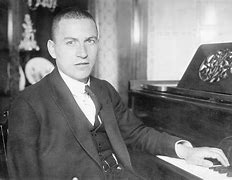(1887 – 1961)
In the summer of his first year in Canada, George set off on a 10-day adventure to New York City and Boston. Here he describes his introduction to New York and musical encounters with a famous and influential pianist:
“I start for New York by bus. Leave Halifax 1 p.m. via Moncton, St. John, Calais (customs – baggage inspection – changing busses – long business)” {July 2 1946}
“On through Bangor, Augusta, Portland, Boston (change busses) arriving New York finally mid-night. Through provinces Maine, New Hampshire, Mass, Connecticut. Staying at Masty Hotel, Riverside Drive where Paul Wittgenstein has apartment.” {July 3}
“Independence Day. Public Holiday. Played to Paul Wittgenstein a.m. and again late afternoon. The rest of the day, I explored the wonders and mysteries of New York, particularly 5th Avenue & Broadway, & ended up in Center Theatre, Rockefeller Center at an Ice show.” {July 4}
“More sight-seeing – 5th Avenue again – Empire State Building & Rockefeller Building. Grand Central Station, Times Square … Played to Paul Wittgenstein again & I dined with him at Regis Restaurant, Broadway.” {July 5}
“To St. Bartholemew’s again – this time to try the organ – 5 manuals, over 190 stops & it is going to be enlarged! To the top of the Empire State Building, 102 storeys high. Played duets again with Paul Wittgenstein …” {July 9}

Paul Wittgenstein was a member of an extraordinary Austrian family that included the father Karl who made millions in the steel industry, three talented older brothers who all committed suicide, and younger brother Ludwig who pursued mathematics and engineering, eventually becoming one of the most celebrated philosophers of the 20th century.
Paul’s dreams of performing the great piano repertoire on the world stage were dashed by World War I; he had the great misfortune of losing his right arm in battle. However he turned misfortune into good, by commissioning composers such as Maurice Ravel, Benjamin Britten, Paul Hindemith, Alexandre Tansman, Erich Wolfgang Korngold, Sergei Prokofiev, Karl Weigl, Franz Schmidt, Sergei Bortkiewicz, Richard Strauss, to write piano pieces for him. This brought into the repertoire a stunning body of works for the left hand alone, and assured for him the everlasting gratitude of future pianists both one-handed and two-handed.
Excerpts of music for left hand alone including Ravel’s Concerto for the Left Hand, played by Paul Wittgenstein, can be seen here on criticalpast.com.